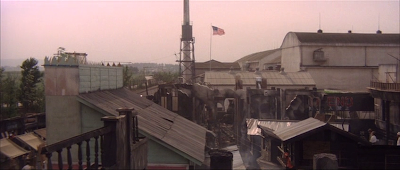 |
| Antonio Gaudi (1985) / Hiroshi Teshigahara |
Antonio Gaudi ties into the rest of the
Teshigahara filmography also via the theme of metamorphoses – his work seems to
delve perpetually into the of this metamorphoses of an object (in
Teshigahara, it is crucial to view the human body as a material, a thing) from one form to the other;
therefore, a number of his films situate themselves in the middle of this mutation.
As a filmmaker, Teshigahara’s pre-occupation remains not the end result of this process, but the process itself – if
presented therefore with a ‘work in progress’, he is bound to focus on the
‘progress’, rather than the larger ‘work’. In Antonio Gaudi, Teshigahara
devotes the final third of the film to a very material study of the Sagrada Família, not arguably Gaudi’s
most famous accomplishment, and yet, incomplete or unfinished. The film
contains several shots of the structure surrounded by construction cranes,
cement, workers, safety helmets, wooden framework and other modern
architectural framework – it is essential therefore, that it is seen as a
work-in-progress and a structure built of brick, mortar, ceramics, stained
glass and wrought iron. It is also not entirely untrue that the film can
sometimes make the site of the church building resemble the laboratory from The Face of Another, where throughout
most of the film, a man’s face is the site of a formidable architectural
ambition.







